- Home
- F. Scott Fitzgerald
All the Sad Young Men Page 4
All the Sad Young Men Read online
Page 4
He paused, gaining confidence from their faces for his final word.
"Or there's another thing you can do," he said slowly, "if Edna wants to leave her children, there's nothing I can do to prevent your running off together."
"I want to go home!" cried Edna again. "Oh, haven't you done enough to us for one day?"
Outside it was dark, save for a blurred glow from Sixth Avenue down the street. In that light those two who had been lovers looked for the last time into each other's tragic faces, realizing that between them there was not enough youth and strength to avert their eternal parting. Sloane walked suddenly off down the street and Anson tapped a dozing taxi-driver on the arm.
It was almost four; there was a patient flow of cleaning water along the ghostly pavement of Fifth Avenue, and the shadows of two night women flitted over the dark façade of St. Thomas's church. Then the desolate shrubbery of Central Park where Anson had often played as a child, and the mounting numbers, significant as names, of the marching streets. This was his city, he thought, where his name had flourished through five generations. No change could alter the permanence of its place here, for change itself was the essential substratum by which he and those of his name identified themselves with the spirit of New York. Resourcefulness and a powerful will--for his threats in weaker hands would have been less than nothing--had beaten the gathering dust from his uncle's name, from the name of his family, from even this shivering figure that sat beside him in the car.
Cary Sloane's body was found next morning on the lower shelf of a pillar of Queensboro Bridge. In the darkness and in his excitement he had thought that it was the water flowing black beneath him, but in less than a second it made no possible difference--unless he had planned to think one last thought of Edna, and call out her name as he struggled feebly in the water.
VII
Anson never blamed himself for his part in this affair--the situation which brought it about had not been of his making. But the just suffer with the unjust, and he found that his oldest and somehow his most precious friendship was over. He never knew what distorted story Edna told, but he was welcome in his uncle's house no longer.
Just before Christmas Mrs. Hunter retired to a select Episcopal heaven, and Anson became the responsible head of his family. An unmarried aunt who had lived with them for years ran the house, and attempted with helpless inefficiency to chaperone the younger girls. All the children were less self-reliant than Anson, more conventional both in their virtues and in their shortcomings. Mrs. Hunter's death had postponed the début of one daughter and the wedding of another. Also it had taken something deeply material from all of them, for with her passing the quiet, expensive superiority of the Hunters came to an end.
For one thing, the estate, considerably diminished by two inheritance taxes and soon to be divided among six children, was not a notable fortune any more. Anson saw a tendency in his youngest sisters to speak rather respectfully of families that hadn't "existed" twenty years ago. His own feeling of precedence was not echoed in them--sometimes they were conventionally snobbish, that was all. For another thing, this was the last summer they would spend on the Connecticut estate; the clamor against it was too loud: "Who wants to waste the best months of the year shut up in that dead old town?" Reluctantly he yielded-- the house would go into the market in the fall, and next summer they would rent a smaller place in Westchester County. It was a step down from the expensive simplicity of his father's idea, and, while he sympathized with the revolt, it also annoyed him; during his mother's lifetime he had gone up there at least every other week-end--even in the gayest summers.
Yet he himself was part of this change, and his strong instinct for life had turned him in his twenties from the hollow obsequies of that abortive leisure class. He did not see this clearly--he still felt that there was a norm, a standard of society. But there was no norm, it was doubtful if there had ever been a true norm in New York. The few who still paid and fought to enter a particular set succeeded only to find that as a society it scarcely functioned-- or, what was more alarming, that the Bohemia from which they fled sat above them at table.
At twenty-nine Anson's chief concern was his own growing loneliness. He was sure now that he would never marry. The number of weddings at which he had officiated as best man or usher was past all counting--there was a drawer at home that bulged with the official neckties of this or that wedding-party, neckties standing for romances that had not endured a year, for couples who had passed completely from his life. Scarf-pins, gold pencils, cuff- buttons, presents from a generation of grooms had passed through his jewel-box and been lost--and with every ceremony he was less and less able to imagine himself in the groom's place. Under his hearty good-will toward all those marriages there was despair about his own.
And as he neared thirty he became not a little depressed at the inroads that marriage, especially lately, had made upon his friendships. Groups of people had a disconcerting tendency to dissolve and disappear. The men from his own college--and it was upon them he had expended the most time and affection--were the most elusive of all. Most of them were drawn deep into domesticity, two were dead, one lived abroad, one was in Hollywood writing continuities for pictures that Anson went faithfully to see.
Most of them, however, were permanent commuters with an intricate family life centering around some suburban country club, and it was from these that he felt his estrangement most keenly.
In the early days of their married life they had all needed him; he gave them advice about their slim finances, he exorcised their doubts about the advisability of bringing a baby into two rooms and a bath, especially he stood for the great world outside. But now their financial troubles were in the past and the fearfully expected child had evolved into an absorbing family. They were always glad to see old Anson, but they dressed up for him and tried to impress him with their present importance, and kept their troubles to themselves. They needed him no longer.
A few weeks before his thirtieth birthday the last of his early and intimate friends was married. Anson acted in his usual rôle of best man, gave his usual silver tea-service, and went down to the usual Homeric to say good-by. It was a hot Friday afternoon in May, and as he walked from the pier he realized that Saturday closing had begun and he was free until Monday morning.
"Go where?" he asked himself.
The Yale Club, of course; bridge until dinner, then four or five raw cocktails in somebody's room and a pleasant confused evening. He regretted that this afternoon's groom wouldn't be along--they had always been able to cram so much into such nights: they knew how to attach women and how to get rid of them, how much consideration any girl deserved from their intelligent hedonism. A party was an adjusted thing--you took certain girls to certain places and spent just so much on their amusement; you drank a little, not much, more than you ought to drink, and at a certain time in the morning you stood up and said you were going home. You avoided college boys, sponges, future engagements, fights, sentiment, and indiscretions. That was the way it was done. All the rest was dissipation.
In the morning you were never violently sorry--you made no resolutions, but if you had overdone it and your heart was slightly out of order, you went on the wagon for a few days without saying anything about it, and waited until an accumulation of nervous boredom projected you into another party.
The lobby of the Yale Club was unpopulated. In the bar three very young alumni looked up at him, momentarily and without curiosity.
"Hello there, Oscar," he said to the bartender. "Mr. Cahill been around this afternoon?"
"Mr. Cahill's gone to New Haven."
"Oh . . . that so?"
"Gone to the ball game. Lot of men gone up."
Anson looked once again into the lobby, considered for a moment, and then walked out and over to Fifth Avenue. From the broad window of one of his clubs--one that he had scarcely visited in five years--a gray man with watery eyes stared down at him. Anson looked quickly away--that figure
sitting in vacant resignation, in supercilious solitude, depressed him. He stopped and, retracing his steps, started over 47th Street toward Teak Warden's apartment. Teak and his wife had once been his most familiar friends--it was a household where he and Dolly Karger had been used to go in the days of their affair. But Teak had taken to drink, and his wife had remarked publicly that Anson was a bad influence on him. The remark reached Anson in an exaggerated form--when it was finally cleared up, the delicate spell of intimacy was broken, never to be renewed.
"Is Mr. Warden at home?" he inquired.
"They've gone to the country."
The fact unexpectedly cut at him. They were gone to the country and he hadn't known. Two years before he would have known the date, the hour, come up at the last moment for a final drink, and planned his first visit to them. Now they had gone without a word.
Anson looked at his watch and considered a week-end with his family, but the only train was a local that would jolt through the aggressive heat for three hours. And to-morrow in the country, and Sunday--he was in no mood for porch-bridge with polite undergraduates, and dancing after dinner at a rural roadhouse, a diminutive of gaiety which his father had estimated too well.
"Oh, no," he said to himself. . . . "No."
He was a dignified, impressive young man, rather stout now, but otherwise unmarked by dissipation. He could have been cast for a pillar of something--at times you were sure it was not society, at others nothing else--for the law, for the church. He stood for a few minutes motionless on the sidewalk in front of a 47th Street apartment-house; for almost the first time in his life he had nothing whatever to do.
Then he began to walk briskly up Fifth Avenue, as if he had just been reminded of an important engagement there. The necessity of dissimulation is one of the few characteristics that we share with dogs, and I think of Anson on that day as some well-bred specimen who had been disappointed at a familiar back door. He was going to see Nick, once a fashionable bartender in demand at all private dances, and now employed in cooling non-alcoholic champagne among the labyrinthine cellars of the Plaza Hotel.
"Nick," he said, "what's happened to everything?"
"Dead," Nick said.
"Make me a whiskey sour." Anson handed a pint bottle over the counter. "Nick, the girls are different; I had a little girl in Brooklyn and she got married last week without letting me know."
"That a fact? Ha-ha-ha," responded Nick diplomatically. "Slipped it over on you."
"Absolutely," said Anson. "And I was out with her the night before."
"Ha-ha-ha," said Nick, "ha-ha-ha!"
"Do you remember the wedding, Nick, in Hot Springs where I had the waiters and the musicians singing 'God save the King'?"
"Now where was that, Mr. Hunter?" Nick concentrated doubtfully. "Seems to me that was--"
"Next time they were back for more, and I began to wonder how much I'd paid them," continued Anson.
"--seems to me that was at Mr. Trenholm's wedding."
"Don't know him," said Anson decisively. He was offended that a strange name should intrude upon his reminiscences; Nick perceived this.
"Naw--aw--" he admitted, "I ought to know that. It was one of YOUR crowd--Brakins. . . . Baker--"
"Bicker Baker," said Anson responsively. "They put me in a hearse after it was over and covered me up with flowers and drove me away."
"Ha-ha-ha," said Nick. "Ha-ha-ha."
Nick's simulation of the old family servant paled presently and Anson went up-stairs to the lobby. He looked around--his eyes met the glance of an unfamiliar clerk at the desk, then fell upon a flower from the morning's marriage hesitating in the mouth of a brass cuspidor. He went out and walked slowly toward the blood-red sun over Columbus Circle. Suddenly he turned around and, retracing his steps to the Plaza, immured himself in a telephone-booth.
Later he said that he tried to get me three times that afternoon, that he tried every one who might be in New York--men and girls he had not seen for years, an artist's model of his college days whose faded number was still in his address book--Central told him that even the exchange existed no longer. At length his quest roved into the country, and he held brief disappointing conversations with emphatic butlers and maids. So-and-so was out, riding, swimming, playing golf, sailed to Europe last week. Who shall I say phoned?
It was intolerable that he should pass the evening alone--the private reckonings which one plans for a moment of leisure lose every charm when the solitude is enforced. There were always women of a sort, but the ones he knew had temporarily vanished, and to pass a New York evening in the hired company of a stranger never occurred to him--he would have considered that that was something shameful and secret, the diversion of a travelling salesman in a strange town.
Anson paid the telephone bill--the girl tried unsuccessfully to joke with him about its size--and for the second time that afternoon started to leave the Plaza and go he knew not where. Near the revolving door the figure of a woman, obviously with child, stood sideways to the light--a sheer beige cape fluttered at her shoulders when the door turned and, each time, she looked impatiently toward it as if she were weary of waiting. At the first sight of her a strong nervous thrill of familiarity went over him, but not until he was within five feet of her did he realize that it was Paula.
"Why, Anson Hunter!"
His heart turned over.
"Why, Paula--"
"Why, this is wonderful. I can't believe it, ANSON!"
She took both his hands, and he saw in the freedom of the gesture that the memory of him had lost poignancy to her. But not to him-- he felt that old mood that she evoked in him stealing over his brain, that gentleness with which he had always met her optimism as if afraid to mar its surface.
"We're at Rye for the summer. Pete had to come East on business-- you know of course I'm Mrs. Peter Hagerty now--so we brought the children and took a house. You've got to come out and see us."
"Can I?" he asked directly. "When?"
"When you like. Here's Pete." The revolving door functioned, giving up a fine tall man of thirty with a tanned face and a trim mustache. His immaculate fitness made a sharp contrast with Anson's increasing bulk, which was obvious under the faintly tight cut-away coat.
"You oughtn't to be standing," said Hagerty to his wife. "Let's sit down here." He indicated lobby chairs, but Paula hesitated.
"I've got to go right home," she said. "Anson, why don't you--why don't you come out and have dinner with us to-night? We're just getting settled, but if you can stand that--"
Hagerty confirmed the invitation cordially.
"Come out for the night."
Their car waited in front of the hotel, and Paula with a tired gesture sank back against silk cushions in the corner.
"There's so much I want to talk to you about," she said, "it seems hopeless."
"I want to hear about you."
"Well"--she smiled at Hagerty--"that would take a long time too. I have three children--by my first marriage. The oldest is five, then four, then three." She smiled again. "I didn't waste much time having them, did I?"
"Boys?"
"A boy and two girls. Then--oh, a lot of things happened, and I got a divorce in Paris a year ago and married Pete. That's all-- except that I'm awfully happy."
In Rye they drove up to a large house near the Beach Club, from which there issued presently three dark, slim children who broke from an English governess and approached them with an esoteric cry. Abstractedly and with difficulty Paula took each one into her arms, a caress which they accepted stiffly, as they had evidently been told not to bump into Mummy. Even against their fresh faces Paula's skin showed scarcely any weariness--for all her physical languor she seemed younger than when he had last seen her at Palm Beach seven years ago.
At dinner she was preoccupied, and afterward, during the homage to the radio, she lay with closed eyes on the sofa, until Anson wondered if his presence at this time were not an intrusion. But at nine o'clock, when Hager
ty rose and said pleasantly that he was going to leave them by themselves for a while, she began to talk slowly about herself and the past.
"My first baby," she said--"the one we call Darling, the biggest little girl--I wanted to die when I knew I was going to have her, because Lowell was like a stranger to me. It didn't seem as though she could be my own. I wrote you a letter and tore it up. Oh, you were SO bad to me, Anson."
It was the dialogue again, rising and falling. Anson felt a sudden quickening of memory.
"Weren't you engaged once?" she asked--"a girl named Dolly something?"
"I wasn't ever engaged. I tried to be engaged, but I never loved anybody but you, Paula."
"Oh," she said. Then after a moment: "This baby is the first one I ever really wanted. You see, I'm in love now--at last."
He didn't answer, shocked at the treachery of her remembrance. She must have seen that the "at last" bruised him, for she continued:
"I was infatuated with you, Anson--you could make me do anything you liked. But we wouldn't have been happy. I'm not smart enough for you. I don't like things to be complicated like you do." She paused. "You'll never settle down," she said.
The phrase struck at him from behind--it was an accusation that of all accusations he had never merited.
"I could settle down if women were different," he said. "If I didn't understand so much about them, if women didn't spoil you for other women, if they had only a little pride. If I could go to sleep for a while and wake up into a home that was really mine-- why, that's what I'm made for, Paula, that's what women have seen in me and liked in me. It's only that I can't get through the preliminaries any more."
Hagerty came in a little before eleven; after a whiskey Paula stood up and announced that she was going to bed. She went over and stood by her husband.
"Where did you go, dearest?" she demanded.
"I had a drink with Ed Saunders."
"I was worried. I thought maybe you'd run away."
She rested her head against his coat.
"He's sweet, isn't he, Anson?" she demanded.

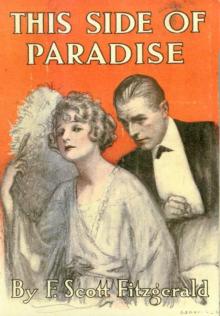 This Side of Paradise
This Side of Paradise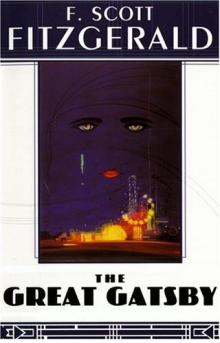 The Great Gatsby
The Great Gatsby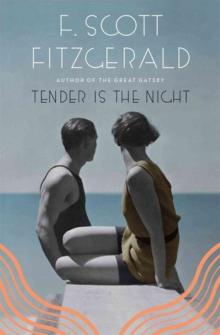 Tender Is the Night
Tender Is the Night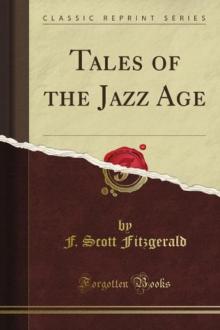 Tales of the Jazz Age (Classic Reprint)
Tales of the Jazz Age (Classic Reprint)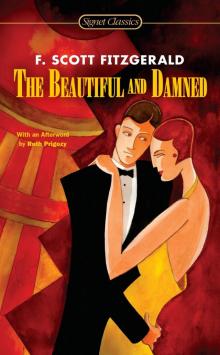 The Beautiful and Damned
The Beautiful and Damned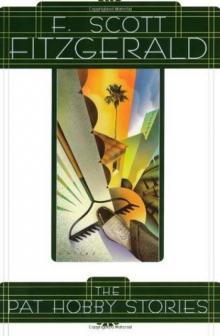 The Pat Hobby Stories
The Pat Hobby Stories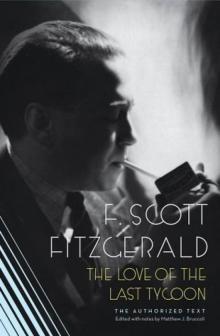 The Love of the Last Tycoon
The Love of the Last Tycoon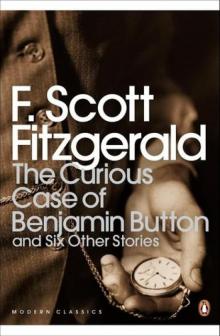 The Curious Case of Benjamin Button and Six Other Stories
The Curious Case of Benjamin Button and Six Other Stories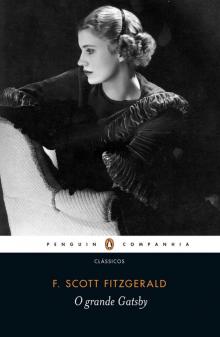 O Grande Gatsby (Penguin)
O Grande Gatsby (Penguin)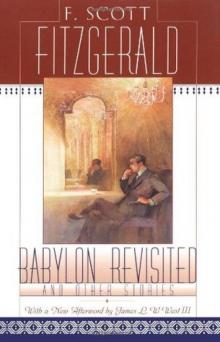 Babylon Revisited and Other Stories
Babylon Revisited and Other Stories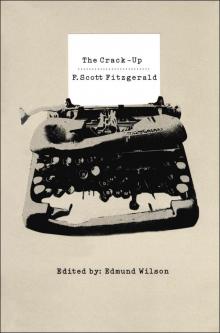 The Crack-Up
The Crack-Up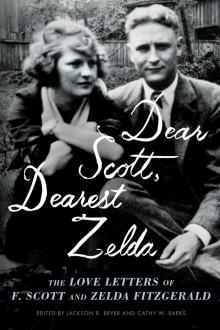 Dear Scott, Dearest Zelda
Dear Scott, Dearest Zelda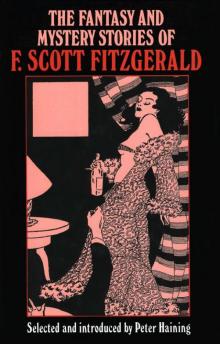 The Fantasy and Mystery Stories of F Scott Fitzgerald
The Fantasy and Mystery Stories of F Scott Fitzgerald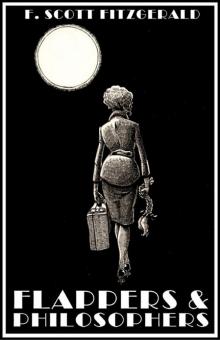 Flappers and Philosophers
Flappers and Philosophers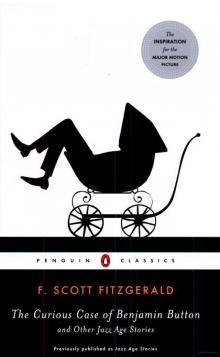 The Curious Case of Benjamin Button and Other Jazz Age Stories (Penguin Classics)
The Curious Case of Benjamin Button and Other Jazz Age Stories (Penguin Classics)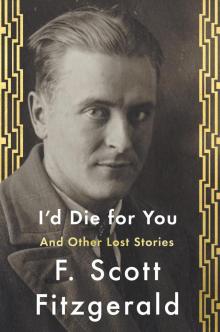 I'd Die For You
I'd Die For You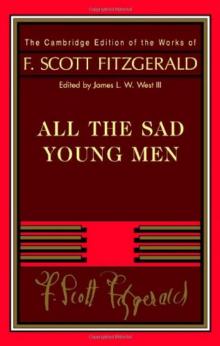 All the Sad Young Men
All the Sad Young Men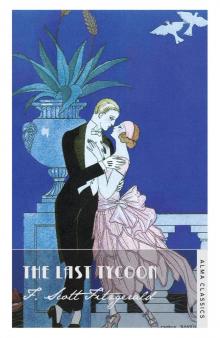 The Last Tycoon
The Last Tycoon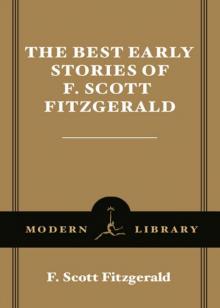 The Best Early Stories of F. Scott Fitzgerald
The Best Early Stories of F. Scott Fitzgerald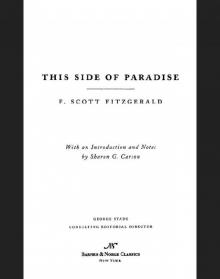 This Side of Paradise (Barnes & Noble Classics Series)
This Side of Paradise (Barnes & Noble Classics Series)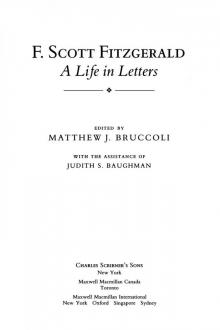 A Life in Letters
A Life in Letters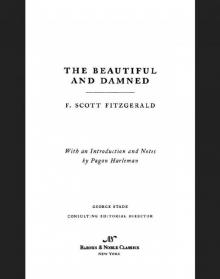 Beautiful and Damned (Barnes & Noble Classics Series)
Beautiful and Damned (Barnes & Noble Classics Series)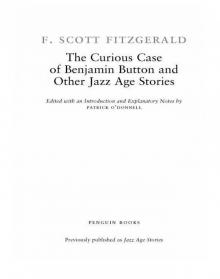 The Curious Case of Benjamin Button and Other Jazz Age Stories
The Curious Case of Benjamin Button and Other Jazz Age Stories Tales of the Jazz Age
Tales of the Jazz Age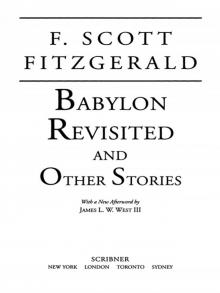 Babylon Revisited
Babylon Revisited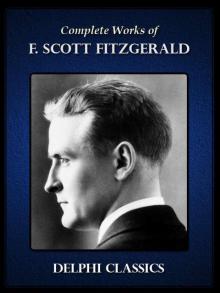 Complete Works of F. Scott Fitzgerald UK (Illustrated)
Complete Works of F. Scott Fitzgerald UK (Illustrated)